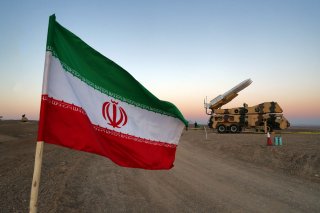Iran Unveils New 'Kheibar Shekan' Missile as Nuclear Talks Continue
Sanctions have not stopped Iran from making major investments in its missile program.
Iran has unveiled a new home-grown missile with a range of just under 1,500 kilometers, according to a Reuters account of a state TV report on Wednesday.
The report showcased the new "Kheibar Shekan" surface-to-surface missile being presented in a static fashion by Iranian military officials. Kheibar Shekan, or “Kheibar buster,” is a reference to an ancient Jewish oasis that fell to Muslim armies under Muhammad. The broadcast proceeded to show a brief clip of the missile being fired from a land-based launcher.
"This long-range missile is domestically manufactured by the Revolutionary Guards (IRGC) ... It has high accuracy and is propelled by solid fuel and is capable of penetrating missile shields," the report stated. Iranian Revolutionary Guard Corps (IRGC) Commander of Aerospace Forces, Brigadier General Amir Ali Hajizadeh, reportedly stated that "the capability of the TNT materials used in the warheads of these missiles has increased many times.” The report alleged that the new weapon is highly accurate and capable of overcoming missile shield systems. The missile’s capabilities, combat readiness, and performance characteristics have not been independently verified.
“We will continue on the path of growth, development and excellence for our missile power, in terms of both quantity and quality,” Maj. Gen. Mohammad Bagheri said at an IRGC base during a ceremony where the missile was displayed.
Iran possesses a wide array of ballistic and cruise missiles, with some items in its catalog capable of reaching Israel and parts of Europe. A December 2021 study from the Washington Institute for Near East Policy concluded that Iran’s ballistic missile arsenal is steadily growing in “size, reach, and accuracy.” The country has pursued sweeping investments into advanced rocket technologies and effectively tapped into domestic resources to offset the effects of international sanctions on Iranian “missile-related technologies.”
The Joint Comprehensive Plan of Action—better known as the Iran Nuclear Deal—dismantled Iran’s nuclear program in exchange for billions of dollars in sanctions relief. The deal was adopted by Iran, the European Union, Germany, and all permanent members of the UN security council in 2015. Former President Trump withdrew from the framework in 2018, claiming that the deal did not sufficiently limit Iran’s nuclear activities and did not stop Tehran’s development of ballistic missiles. The Biden administration has sought to re-enter the deal, but ongoing negotiations with Tehran have not yielded substantive results. Top administration officials reportedly warned in a classified briefing earlier this week that Iran is two months away from producing enough material for a nuclear bomb.
Mark Episkopos is a national security reporter for the National Interest.
Image: Reuters.

